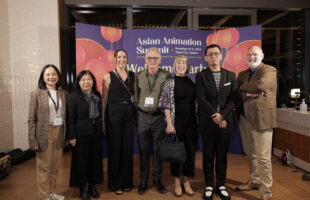organized by trade publications Television Asia Plus and Asia Image, SuperPitch HD provides a stage for aspiring Asian programme-makers to pitch HD concepts for original content to regional media players under real-world pitching conditions. Superpitch has evolved from animation only, to include all genres – and 2007’s Superpitch 2.0 had a cross-platform theme. Twenty eight high quality entries were received from countries across the region – notably Taiwan, home to last year’s winner Sofa Studio – as well as a strong showing from Thailand, Malaysia, China and Singapore. The six shortlisted finalists will give a presentation before a jury panel comprising commissioning editors, senior programme acquisition executives and producers from the region’s major networks and production companies. Also in attendance will be a range of programmers and increasingly – advertising and media strategy agencies seeking sponsorship opportunities and content-led solutions for their clients. Apart from the emphasis on HD, another major difference for Superpitch in 2008 is the exciting prizes on offer. Apart from the invaluable pitching experience, media exposure and the opportunity to meet some of the region’s most influential programming decision-makers, this year’s winner has the opportunity to undertake a six-month internship at Discovery Networks Asia Pacific (worth S$10,000) as well as post-production hours sponsored by Iceberg. On the judging panel this year is Discovery Networks Asia Pacific’s vice president of content, Vikram Channa. Responsible for content strategy for all channels across DNAP’s brand portfolio, he manages programme sourcing, planning and scheduling functions, including the supervision of programming teams in local markets, as well as the production and development unit. Channa has just completed a co-production with the Singapore EDB) called Ecopolis and is in the midst of producing a six-part series on food called Culinary China for Discovery Channel in partnership with the MDA, and the network also has a local co-production initiative in Australia and New Zealand called Discovery Ignite from which they have produced Storm Surfers and The Future Makers for Discovery Channel and Lonely Planet’s Natural Born Traveler for Discovery Travel & Living. In addition, they are working with the Government Information Office in Taiwan to produce Fun Taiwan, a travel series on Discovery Travel & Living and have a new series called Unknown Taiwan premiering on Discovery Channel. “We are always on the look out for content which has local/regional relevance across genres like engineering, science and technology, culture and history. Stories which tend to be character driven will always get our attention – as will topicality,” says Channa. On the value of events like Superpitch, Channa says, “There are a lot of ideas in the marketplace. It’s really competitive out there. Commissioning editors with networks are constantly being pitched at. But only those producers who are adept at the art of pitching get a fair hearing and the proverbial foot in the door. Events like Superpitch not only create a forum where there is access to network creatives but also an opportunity to pick up tips on how to pitch well and prosper.” His advice for those producers looking to becoming adept at pitching? “Get to the core of the idea quickly, as time is of essence. Always think about what is unique to your concept and approach and use that to hook the panel in the beginning. Be prepared to answer questions about access to key characters as well as on budgets. “It is a tough business. At Discovery Networks Asia-Pacific, we have launched many industry development schemes like the First Time Film-Makers initiative targeting young filmmakers to help provide up-and-coming talents with the opportunity to learn and have an international platform to showcase their work. But to stay competitive and have a chance, aspiring filmmakers should focus on what networks really need and to be able to align this to their passion projects. Usually watching what is on air is a good way to study the trends. But even this may not be enough in terms of gauging the next big idea. Building a rapport with network executives to get an accurate and early sense of what is coming up next is usually a smart way of producing winning ideas.” Joining the judging panel for the first time this year is Jack Shih, associate professor at Taipei National University of Arts in Taiwan, and also the director of Red Alien Studio, working on independent animated films. His past works have four times won Golden Harvest Awards and twice won Taipei Films Awards. “I am looking for good story-telling pieces for film or TV series, which can deliver great ideas to the audiences and (that have) future development in arts and business consideration,” says Shih. “As I know each contestant has only five minutes of presentation, it is a challenge for pitching a completed story or idea. I would suggest shortening the introduction and doing the best to show more visual materials such as conceptual design, and film prototype. Contestants need to deliver a clear and understandable subject and persuade the panel why audience would like it.” Continues Shih, “What I can see from the value of Superpitch is it could be one of the remarkable events for Asia TV industry, the competition of Superpitch can draw attention from buyers or investors, it is a great stage to show good ideas from the filmmakers and it is also a great opportunity for meeting industrial people to help developing the production.” As for Shih’s advice do you have for aspiring TV and film-makers looking to get a break into the industry, “I would advise that they find themselves a position within the industry first, such as becoming a director, photographer, screenwriter, etc. In the industry companies would rather look for professionals instead of general multi-skills, therefore, it is important to start from your interests, and continue to (make those) your professional skills.” From sponsor Iceberg Design Pte Ltd comes Senior Animator/Visual Effects Supervisor Alfred Sim, worked as an animator for Caldecott Productions and FrameWorks. Currently a partner in Iceberg Design, his primary role is as an animator and vfx supervisor for TVC, broadcast design and feature films; projects include channel branding and idents for HBO, MTV, ESPN, RTL, Astro and he’s a post-production consultant on DI workflow for film output. Sim is currently post supervising 2 local movies, and says that he’s always on the lookout for projects that have a genuine Asian voice, and that have unique story lines. “Be prepared, do the research, have some references of how the movie should look and believe in your story.” He sees Superpitch as an opportunity for directors and script writers to share their ideas and also to gain more experience in pitching, above all, he says, “Believe in your work and go into it with a passion.” And returning as a Superpitch judge this year, is Patrick Schult, Managing Director, FremantleMedia Asia Pte Ltd. With a background in production Schult is responsible for operations in FremantleMedia offices across the Asian region, including the production and development of programming in Asia and the roll-out of established FremantleMedia Worldwide properties. Formerly, as SVP, Production and Development, Southern Europe, Patrick provided creative leadership in the production, development and the selling of programmes in France, Italy, Spain and Portugal. Regionally Fremantle has quite a few shows in pre production and production….including Hole in the Wall in Hong Kong, Indonesia, India, The Philippines and soon China. Idol is currently airing in India and Vietnam; Thank God You’re Here airs in Indonesia and will soon be in India. Project Runway is airing in The Philippines and will soon be in South Korea and Poker Face is airing in Vietnam and will soon be in India. Schult says he favours innovative projects which allow for additional content to reach the viewer across numerous platforms and advises finalists to, “Practice the pitch over and over, welcome criticism of the pitch and make sure the key aspects of the concept are driven home a number of times throughout the presentation. Opening and closing remarks are also very important as this will be top of mind for the recipients of any pitch.” He continues, “Good ideas are pitched hundreds of times before being taken up, so every chance to present the concept should be welcomed. Furthermore, ideas change along the way so the invitation of contributions to the concept should always be encouraged. Most concepts don’t end up airing in their original form. Persistence is the key to this difficult business. Enjoy the projects you choose to work on or otherwise the output will be substandard.” TVAplus
Ad – Before Content
Related Articles
Publicis India unveils heartwarming “Thank You TV” campaign for ZEE TV
Sphere Abacus sells true crime feature documentary Murder & Madness: The Cult Conspiracy to Prime Video
Spingo Continues Global Push into the Americas as O4 Media Signs Option Agreements with LA-based 5X Media and Brazilian outfit LaReina Entertainment
Keshet boards Red Alert with producer Lawrence Bende
FIFTH SEASON inks strategic partnership with Front Street Pictures for TV movies slates
Taiwan Hosts Asian Animation Summit for the First Time Bringing Together Major Buyers Netflix and Warner Bros.







